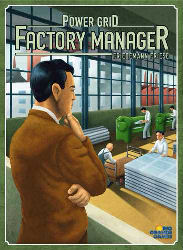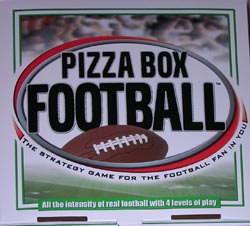 This week, I had expected there to be six of us so was planning to split into two groups. However, when we learned Mark W was stuck on Ludlow station, we opted to try Friedemann Friese’s latest game – Power Grid: Factory Manager – a game which has nothing to do with Power Grid but is still a tense, economic optimisation game.
This week, I had expected there to be six of us so was planning to split into two groups. However, when we learned Mark W was stuck on Ludlow station, we opted to try Friedemann Friese’s latest game – Power Grid: Factory Manager – a game which has nothing to do with Power Grid but is still a tense, economic optimisation game.
The game is played over five rounds and each round is identical: Firstly, you bid for turn order tiles, which also determine how much discount you receive on your purchases each round. Then each player selects which factory components will be available for purchase, with the cheapest of each component having to be selected for possible sale before the more juicy stuff. Each player then buys what they want or can afford and places them in their factory. You are trying to obtain components that increase your production and storage or decrease your manpower requirements, while keeping control on your energy costs. Each time you add / replace something in your factory, you adjust these four factors and then receive income based on the lower of your production / storage capacity, after paying your energy costs (the price of which increases during the game. Income in the final round is doubled and then whoever has the most money wins.
We all thought this was an excellent design although, with five players, more stuff comes into the market and the length of the game increases accordingly. It took us around 2.5 hours to play, which is a bit long particularly as there is a big chunk of downtime while others take their turns. Nige and I almost decided to play a game of Macao while we were waiting at one stage. In the first round of our game, only one storage tile came up so the first player (me) snapped it up and gained an early income advantage on the others, although I had to tie up more workers for the next round. Mechanisation seemed a good option as it releases more workers to buy stuff with so by the third round some of us had factories completely populated by robots. I think Nige and I were the only ones to take seasonal workers in one round but Nige soon saw the error of his ways as he didn’t actually employ them in the next round so had basically wasted 14 Elektros. The fourth round saw me last in player order but with nothing decent to buy. I needed storage but there was none so I had to have a frugal round, spending just a little on upgrading a couple of machines. However, it meant I needed to be first in player order for the final round and it cost me two workers to secure that. However, I could still afford it in my robot-run factory. Guy on the other hand had all bar one of his workers in the canteen, although he was ahead on the income scale the previous round, so we experienced the quickest Guy turn ever in the history of the club. He had placed his worker for turn order so could add nothing to the market and had nothing to buy. We knew the scores were going to be close but didn’t realise it ws that close as just 6 Elektros separated first and third. My “bad” penultimate turn, where I virtually spent nothing was just enough to give me the win – phew! As I said, very tense. Ratings were pretty good although Nige and I knocked it down a notch due to the game length. Interested to see how it plays with 3 or 4 players.

 The next game from Days of Wonder looks to be a really interesting deduction game set on the Orient Express. Here is some blurb describing the game:
The next game from Days of Wonder looks to be a really interesting deduction game set on the Orient Express. Here is some blurb describing the game: This week, I’d just got a copy of The World Cup Card Game 2010 which, unsurprisingly, is a card game version of the board game The World Cup Game, centred on the 2010 tournament. Designed by Shaun Derrick and published by Games for the World, it is simply a deck of cards and a two page rule sheet.
This week, I’d just got a copy of The World Cup Card Game 2010 which, unsurprisingly, is a card game version of the board game The World Cup Game, centred on the 2010 tournament. Designed by Shaun Derrick and published by Games for the World, it is simply a deck of cards and a two page rule sheet. With the Superbowl coming up this Sunday, it was time to dig out Pizza Box Football for my annual predict the score using the team sheets produced specifically for this game by On The Line Games. So, here’s a quick summary of what you can expect to happen in Superbowl XLIV.
With the Superbowl coming up this Sunday, it was time to dig out Pizza Box Football for my annual predict the score using the team sheets produced specifically for this game by On The Line Games. So, here’s a quick summary of what you can expect to happen in Superbowl XLIV. January turned out to be a bit slow on the game playing front with me missing two of our Friday night sessions. This coupled with a few new games meant the unplayed total only reduced by one during the month:
January turned out to be a bit slow on the game playing front with me missing two of our Friday night sessions. This coupled with a few new games meant the unplayed total only reduced by one during the month: Shaun Derrick has just announced that a card game based on his popular World Cup Game system is now available to buy.
Shaun Derrick has just announced that a card game based on his popular World Cup Game system is now available to buy.